Quantum computing represents one of the most significant technological breakthroughs of our time, fundamentally changing how we approach computation and problem-solving. This revolutionary technology harnesses the strange and powerful principles of quantum mechanics to process information in ways that classical computers simply cannot match. As this field rapidly evolves, it's creating profound implications for students across all disciplines, from computer science to chemistry, physics to finance.
Understanding Quantum Computing
The Core Concept
Traditional computers process information using bits that exist in definitive states of either 0 or 1. Quantum computers, however, utilize quantum bits or "qubits" that can exist in multiple states simultaneously through a phenomenon called superposition. This allows quantum computers to perform many calculations at once, rather than processing them sequentially like classical computers.
Key Quantum Principles
Three fundamental quantum phenomena make quantum computing possible:
- Superposition: Qubits can exist in multiple states simultaneously, allowing quantum computers to explore many possible solutions to a problem at the same time
- Entanglement: Quantum particles can become interconnected, so the state of one qubit instantly affects another, regardless of distance
- Interference: Quantum computers can amplify correct answers and cancel out wrong ones through quantum interference patterns
Current State and Applications
Quantum computing is already showing promise across various fields. Major companies like IBM, Google, and Microsoft are developing quantum systems with increasing qubit counts and improved stability. Current applications include:
- Drug Discovery: Simulating molecular interactions to accelerate pharmaceutical research
- Financial Modeling: Optimizing portfolios and risk analysis
- Cryptography: Both breaking current encryption methods and developing quantum-safe security protocols
- Artificial Intelligence: Enhancing machine learning algorithms and pattern recognition
- Weather Prediction: Processing vast amounts of atmospheric data for more accurate forecasting
How Students Will Be Affected
Academic Curriculum Evolution
Students across multiple disciplines will encounter quantum computing concepts integrated into their coursework:
- Computer Science Students will need to learn quantum programming languages like Qiskit, Cirq, and Q#, as well as quantum algorithms such as Shor's algorithm for factoring and Grover's algorithm for searching
- Physics and Chemistry Students will study quantum mechanics applications in computational contexts, using quantum simulators to model molecular behavior and materials science
- Mathematics Students will explore linear algebra, probability theory, and complex numbers as they relate to quantum states and operations
- Engineering Students will learn about quantum hardware design, error correction, and the physical implementation of quantum systems
New Career Pathways
The quantum computing revolution is creating entirely new career opportunities:
- Quantum Software Engineers who develop algorithms and applications for quantum computers
- Quantum Hardware Engineers who design and build quantum computing systems
- Quantum Information Scientists who research theoretical aspects of quantum computation
- Quantum Cryptographers who develop security protocols for the quantum age
- Quantum Application Specialists who apply quantum computing to specific industries like finance, pharmaceuticals, or logistics
Skills Development Requirements
Students will need to develop a unique combination of skills:
- Interdisciplinary Knowledge: Understanding both computer science principles and quantum physics fundamentals
- Mathematical Proficiency: Strong foundation in linear algebra, statistics, and complex analysis
- Programming Skills: Familiarity with quantum programming frameworks and classical programming languages
- Problem-Solving Abilities: Thinking differently about computational problems and recognizing when quantum approaches offer advantages
Educational Infrastructure Changes
Universities and schools are rapidly adapting their infrastructure:
- Quantum Labs: Educational institutions are establishing quantum computing laboratories with access to real quantum hardware through cloud platforms
- Online Resources: Students can access quantum computers remotely through platforms like IBM Quantum Experience and Google's Cirq
- Certification Programs: New quantum computing certifications and degree programs are emerging to meet industry demand
- Research Opportunities: Undergraduate and graduate students can participate in cutting-edge quantum research projects
Preparing for the Quantum Future
For Current Students
Students can begin preparing for the quantum computing era by:
- Taking foundational courses in mathematics, physics, and computer science
- Exploring online quantum computing tutorials and simulators
- Participating in quantum computing competitions and hackathons
- Joining quantum computing clubs and communities
- Pursuing internships with companies working on quantum technologies
For Educators
Educational institutions must adapt by:
- Updating curriculum to include quantum computing concepts
- Training faculty in quantum computing principles
- Investing in quantum computing resources and partnerships
- Developing interdisciplinary programs that bridge traditional boundaries
- Creating pathways for students to gain hands-on quantum experience
Industry Collaboration
The quantum computing field requires close collaboration between academia and industry:
- Internship Programs: Companies are offering specialized quantum computing internships
- Research Partnerships: Universities are partnering with tech companies on quantum research projects
- Guest Lectures: Industry experts are sharing real-world quantum applications with students
- Equipment Access: Companies are providing educational access to quantum hardware and software platforms
Challenges and Opportunities
Technical Challenges
Students entering the quantum field will work on solving significant technical challenges:
- Quantum Error Correction: Developing methods to maintain quantum information stability
- Scalability: Building quantum computers with thousands or millions of stable qubits
- Algorithm Development: Creating new quantum algorithms for practical applications
Ethical and Social Considerations
The quantum revolution also raises important questions that students will need to address:
- Privacy and Security: How quantum computers will impact current encryption and data protection
- Economic Disruption: Which industries and jobs may be transformed or displaced
- Global Competition: How nations will compete in quantum technology development
- Access and Equity: Ensuring quantum computing benefits are distributed fairly
The quantum computing revolution is not just changing technology—it's transforming education itself. Students today are the first generation to grow up alongside this emerging technology, positioning them to become the quantum workforce of tomorrow. Those who embrace this challenge and begin developing quantum literacy now will find themselves at the forefront of one of the most exciting and impactful technological advances in human history.
As quantum computing continues to mature from experimental laboratory curiosities to practical computational tools, students who understand these systems will be uniquely positioned to solve humanity's most complex challenges, from climate change and disease to optimization problems that currently seem intractable. The quantum future is not just coming—it's already here, and it's reshaping how students learn, think, and prepare for their careers.








Be the first one to comment on this story.